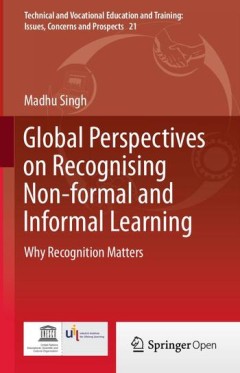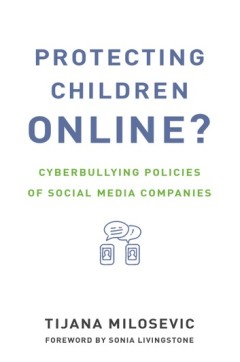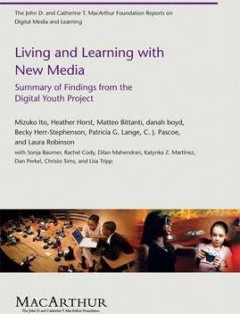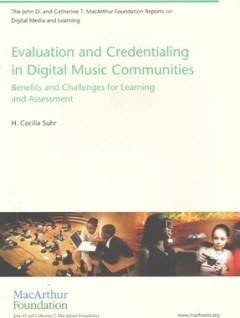Filter by
# Debug Box
/var/www/htdocs/pustaka-digital/lib/SearchEngine/SearchBiblioEngine.php:688 "Search Engine Debug 🔎 🪲"
Engine Type ⚙️: "SLiMS\SearchEngine\SearchBiblioEngine"
SQL ⚙️: array:2 [ "count" => "select count(sb.biblio_id) from search_biblio as sb where sb.opac_hide=0" "query" => "select sb.biblio_id, sb.title, sb.author, sb.topic, sb.image, sb.isbn_issn, sb.publisher, sb.publish_place, sb.publish_year, sb.labels, sb.input_date, sb.edition, sb.collation, sb.series_title, sb.call_number from search_biblio as sb where sb.opac_hide=0 order by sb.last_update desc limit 10 offset 5520" ]
Bind Value ⚒️: []

Global perspectives on recognising non-formal and informal learning : why rec…
This book deals with the relevance of recognition and validation of non-formal and informal learning education and training, the workplace and society. In an increasing number of countries, it is at the top of the policy and research agenda ranking among the possible ways to redress the glaring lack of relevant academic and vocational qualifications and to promote the development of competences…
- Edition
- -
- ISBN/ISSN
- 9783319152783
- Collation
- xix, 220p : ill.
- Series Title
- -
- Call Number
- 370.11 SIN g

Garden learning : a study on European botanic gardens' collaborative learning…
"From 2007-2013 the European 7th Framework Program Science in Society (FP7) funded a multitude of formal and informal educational institutions to join forces and engage in alternative ways to teach science—inside and outside the classroom—all over Europe. This book reports on one of these projects named INQUIRE which was developed and implemented to support 14 Botanic Gardens and Natural Hi…
- Edition
- -
- ISBN/ISSN
- 9781909188662
- Collation
- vi, 185p. : ill.
- Series Title
- -
- Call Number
- 370 KAP g

Shadow libraries : access to educational materials in global higher education
How students get the materials they need as opportunities for higher education expand but funding shrinks.From the top down, Shadow Libraries explores the institutions that shape the provision of educational materials, from the formal sector of universities and publishers to the broadly informal ones organized by faculty, copy shops, student unions, and students themselves. It looks at the hist…
- Edition
- -
- ISBN/ISSN
- 9780262535014
- Collation
- -
- Series Title
- -
- Call Number
- 070.5 SHA s

Protecting children online? : cyberbullying policies of social media companies
This book investigates regulatory and social pressures that social media companies face in the aftermath of high profile cyberbullying incidents. The author’s research evaluates the policies companies develop to protect themselves and users. This includes interviews with NGO and social media company reps in the US and the EU. She triangulates these findings against news, policy reports, evalu…
- Edition
- -
- ISBN/ISSN
- 9780262344104
- Collation
- xv, 276p. : ill.
- Series Title
- -
- Call Number
- 302.30285 MIL p

Open access
A concise introduction to the basics of open access, describing what it is (and isn't) and showing that it is easy, fast, inexpensive, legal, and beneficial.The Internet lets us share perfect copies of our work with a worldwide audience at virtually no cost. We take advantage of this revolutionary opportunity when we make our work “open access”: digital, online, free of charge, and free of …
- Edition
- -
- ISBN/ISSN
- 9780262517638
- Collation
- xii, 241p. : ill
- Series Title
- -
- Call Number
- 070.57973 SUB o

Living and learning with new media : summary of findings from the digital you…
This report summarizes the results of an ambitious three-year ethnographic study, funded by the John D. and Catherine T. MacArthur Foundation, into how young people are living and learning with new media in varied settings—at home, in after school programs, and in online spaces. It offers a condensed version of a longer treatment provided in the book Hanging Out, Messing Around, and Geeking O…
- Edition
- -
- ISBN/ISSN
- 9780262513654
- Collation
- xx, 98p. : ill.
- Series Title
- -
- Call Number
- 302.23108350973 MIZ l

Evaluation and credentialing in digital music communities : benefits and chal…
An examination of the use of digital badges as a reward for both casual online music evaluators and professional musicians.Professional and amateur musicians alike use social media as a platform for showcasing and promoting their music. Social media evaluation practices—rating, ranking, voting, “liking,” and “friending” by ordinary users, peers, and critics—have become essential pro…
- Edition
- -
- ISBN/ISSN
- 9780262527149
- Collation
- vii, 102p. : ill.
- Series Title
- -
- Call Number
- 780.2854678 SUH e

Learning at not-school : a review of study, theory, and advocacy for educatio…
A review of research on “not-school” learning that investigates what is distinctive in the quality of learning in these settings.Schools do not define education, and they are not the only institutions in which learning takes place. After-school programs, music lessons, Scouts, summer camps, on-the-job training, and home activities all offer out-of-school educational experiences. In Learning…
- Edition
- -
- ISBN/ISSN
- 9780262518246
- Collation
- vii, 92p. : ill.
- Series Title
- -
- Call Number
- 371.19 SEF l

The future of the curriculum : school knowledge in the digital age
An examination of curriculum innovations that are shaped by new ideas about digital media and learning.Although ideas about digital media and learning have become an important area for educational research, little attention has been given to the practical and conceptual implications for the school curriculum. In this book, Ben Williamson examines a series of contemporary curriculum innovations …
- Edition
- -
- ISBN/ISSN
- 9780262518826
- Collation
- vii, 139p. : ill.
- Series Title
- -
- Call Number
- 375.001 WIL f

Documenting and assessing learning in informal and media-rich environments
An extensive review of the literature on learning assessment in informal settings, expert discussion of key issues, and a new model for good assessment practice. Today educational activities take place not only in school but also in after-school programs, community centers, museums, and online communities and forums. The success and expansion of these out-of-school initiatives depends on our ab…
- Edition
- -
- ISBN/ISSN
- 9780262527743
- Collation
- vii, 156p. : ill.
- Series Title
- -
- Call Number
- 371.04 LEM d
 Computer Science, Information & General Works
Computer Science, Information & General Works  Philosophy & Psychology
Philosophy & Psychology  Religion
Religion  Social Sciences
Social Sciences  Language
Language  Pure Science
Pure Science  Applied Sciences
Applied Sciences  Art & Recreation
Art & Recreation  Literature
Literature  History & Geography
History & Geography